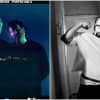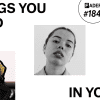Jens Lekman, the great songwriter from Sweden, came to New York last month in support of his third album, I Know What Love Isn't, out now. After he played a few songs for FADER TV, we sat down for tea and a talk. In this interview, Jens Lekman makes the case for moving to Gothenburg, against putting up band stickers in bathrooms, for going running at night and against becoming a standup comic.
I love music from Gothenburg, is there are any reason I shouldn't just move there? Well, Gothenburg used to be a really tacky place. It was not cool at all. It was known for bingo—we had the biggest bingo TV show in Sweden, the biggest TV show in Sweden at the time. And we had shrimps, and we had a bad sense of humor. Seafood in general, I guess. And that's sort of what Gothenburg was known for. Being a band from Gothenburg was quite horrible. There was no self-esteem or self-confidence whatsoever. And then at some point, about 12 years ago maybe, there was this feeling like people wanted to embrace all this that was tacky and not cool and make it their thing and be proud of it and make some sort of art out of it. That's where all these bands came from. The music was a reaction against everything we were bombarded with from the US and the UK. Because for a very long time, if you were a band from Gothenburg, you would send your singer to be an au pair or something in London or New York so they would pick up the right accent. There was no trace of the Gothenburg history whatsoever, then all of a sudden it turned to the opposite, where people just get really sick of this lack of pride and wanted to be proud of what we had. And I think the tricky part, if you think of the music as an argument for living there now, because it's been 10 years since that started, Gothenburg is cool now and musicians are very confused with how to deal with that. It's not the most inspiring place at the moment. If your creativity comes from boredom and trying to be proud of something that's not cool, there's nothing really interesting coming out of Gothenburg right now. All the interesting stuff is the stuff that is established already I feel.
Is that why you've traveled so much lately? No, not at all. I mean, I took the opportunity. If you get the opportunity to travel, you do it. But I have to say I really love living in Gothenburg right now. Even though I'm almost never there. The times when I am there, I love being able to just go down to the local bar and my friends will be there without having to check beforehand where they are. Because it's such a tiny town, you know.
On your blog, you posted about reading I Remember by Joe Brainard. What is something you remember? A lot of roads and a lot of faces and a lot of venue backstage rooms. I remember a lot of stickers from bands that I've never heard of. Self-promotion seems to be a curse over bands that make stickers and put them in backstage rooms. Have you ever seen a sticker for a band you've heard of? I've never heard of any one of them. Especially the ones who also draw gigantic penises next to them. I know it sounded like I only remember touring memories—I remember other stuff as well, you know. I remember Australia. I remember living in Melbourne. Those are some sweet memories that I hold very dear and kind of make me sad sometimes.
What brought you there? I fell in love with the music coming out of there when I was quite young, especially The Avalanches. They made me feel like what I was doing…like I wasn't crazy. Like the music I was doing, someone else was thinking the same thing. And I read about Melbourne and I saw some movies from Melbourne and I started thinking that this must be the most beautiful city in the world. I got to go on tour in 2005, the first time, and got to know so many people there who were just really nice and just decided that I wanted to move there. It became this dream that just grew way too big for it's own good. I still don't know how to chop that dream down, really.
Did you ever meet up with The Avalanches? Yeah. I would always see [Darren] Seltmann walking around with his baby and a cappuccino in the other hand, just looking really relaxed. I can totally understand that they've taken 12 years, or whatever it is, to make their second album, because they just seem so relaxed.
You didn't take quite that long, but there were five years between your last two albums. The main problem was that I was looking for—I had a problem with the dramaturgy on the record. I felt like the songs weren't fitting together. I gave them to a friend, Henning from The Tough Alliance, and he was like "Yeah, you're right. They don't fit together, these songs." And we started talking about it, and he helped me put together the Argument With Myself EP last year. It wasn't until I had taken those songs out and put them on something else with his help that I started realizing where the other songs were going. I think the other album was really going in a circle in so many ways. The circle seems to be recurring several times on the record. The way it starts and ends with the same song. The circle is even on the front cover. So it's a circuitous record.
What does that mean, though? When I started writing the songs for this record, the last thing that I wanted to write about was this fucking breakup. I felt like it was counter-productive. I started writing songs about, you know, heartbreak songs. And they just sounded like a whiny 17-year-old emo kid. I think I had to go in a circle where I started writing songs about other things that eventually led me back to the breakup anyway. But I had to make that journey around to get some perspectives on things. And to sort of land where it was not just my diary entries but actually something that people could relate to somehow. Something that was more essentially human.
I've noticed that at your concerts, when you tell a story before a certain song, it's always pretty much the same. Why do you do it that way, like scripted? I change details sometimes, but generally if I don't have a story thought out and do it the same way every time, if I start improvising, it's just a recipe for disaster. I've tried it in the past and it just doesn't work. When I started going to see stand-up comedians—and I'm a big stand-up comedy fan—I noticed that they did the jokes the same way every night. What was so fascinating was the way, with timing being so important in comedy, just the way they could wait for the crowds reaction and then just BAM! They knew exactly when to have every detail come in. So it was just about rhythm, while the content was always the same.
Your style of songwriting really lends itself to stand-up comedy, actually. Stand-up comedy is the scariest thing I could think of doing ever. It seems like the hardest and most ungrateful job you could have. The only thing that keeps me from doing it, and the thing that keeps me being a musician, is that I can always fall back on the song. The song, it's part of the story. So for me just to go up and tell the story—I don't think that would really work. It's always about how it leads up to the song.
What are your favorite things to do besides music? Running. I love running. I think it does something that all people who write or do something creative have to—it might not be running, but I think you have to do something like that. Have you read that book by Haruki Murakami, What I Talk About When I Talk About Running? He explains it perfectly in the book. When you do this thing, when you just have to constantly wrap your brain around words and tiny details, it's like being a micro-miniature artist sometimes who just gets so obsessed by details. You have to let your brain go on vacation. I love going out running an hour per day. I like when there's no people outside and it's dark. I can just run on the street without any cars being there. For me it's not punishment anymore, because once you run for a certain amount of time, your body just gets so used to it. I'm not even breathing hard when I'm running. I breathe completely normal. I sweat a little bit.


